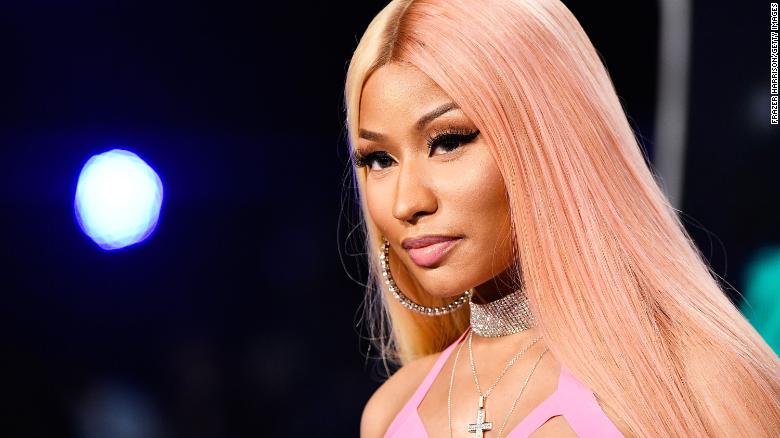This is how the covid-19 attacks the unvaccinated completely 5:10
(CNN) -
Did you see Nicki Minaj's tweets about why she won't get vaccinated against covid-19?
Let's talk about them.
On Monday, Minaj said her cousin in Trinidad, where the superstar is from, "will not get vaccinated because his friend put it on and became impotent. His testicles swelled up."
There is no link between COVID-19 vaccines and infertility, as the Centers for Disease Control and Prevention, CDC, explained in August.
This unfounded fear is not new, vaccine expert and pediatrician Dr. Yvonne Maldonado, chief of the Division of Pediatric Infectious Diseases at Stanford University School of Medicine, told CNN earlier this year.
"My God, people have been saying this about all vaccines for as long as I can remember," said Maldonado, who also chairs the Committee on Infectious Diseases for the American Academy of Pediatrics.
"There is no evidence that this vaccine affects development or fertility."
advertising
1 in 500 US residents has died of covid-19
Nicki Minaj at the MTV Video Music Awards in August 2017 in Inglewood, California.
Minaj also suggested that she is not vaccinated, saying that she is waiting until she feels she "has done enough research."
CNN's chief medical correspondent, Dr. Sanjay Gupta, debunked the rapper's claim on "New Day."
"The Journal of the Medical Association looked specifically at fertility problems and found no fertility problems," he said.
"I appreciate that you want to do the research. [The information] is there. I wish his cousin's friend the best, but that is not related to the vaccine."
The limits of celebrity influence
It can be easy, in a way, to worry, to ask yourself: Could Minaj's tweets make a serious problem worse?
After all, across the country and across all demographics, vaccine concerns and total rejection of vaccines remain a problem.
However, that line of thinking feels a bit rash and perhaps even misinterprets the broader dynamics of celebrity influence in politics.
Minaj isn't the only celebrity whose dominance has come under scrutiny, and she certainly won't be the last.
According to Mark Harvey, author of the 2018 book, "Celebrity Influence: Politics, Persuasion and Issue-Based Advocacy," there are generally two types of celebrity power: "the ability to 'highlight' issues in the media and to persuade audiences ".
Rap star Nicki Minaj is shocked to share she was in an abusive relationship
This company pays US $ 1,000 to employees who get vaccinated 1:01
Fundamentally, celebrities are not persuasive all the time on all topics.
Their influence is complicated by a variety of factors, including their experience, their affiliations with advocacy groups, and their connection to the issue (think Ellen DeGeneres or Billy Porter on LGBTQ rights).
But Harvey argues that what we are seeing with the coronavirus pandemic, and specifically with the covid-19 vaccines, is completely different.
"The question is what happens when a celebrity is trying to persuade on a controversial issue, on something that people are so divided that they are not going to change their mind, on issues like gun control and abortion? having a moment like that, "Harvey told CNN, adding that the cultural divide is much greater today than it was in the 1950s, when Elvis Presley was able to get a polio shot on" The Ed Sullivan Show "and convince teenagers skeptical of getting vaccinated.
"Today, Nicki Minaj says something about certain topics, and he's probably not going to move the needle at all," Harvey said.
"Basically people on the right are going to say, 'Look, Nicki Minaj. She's great.' And people on the left can say, 'She's a bad influence.' And that's probably the end."
This is not to suggest that people are wrong for being irritated by Minaj's tweets.
By not fully supporting the trove of data demonstrating the safety and efficacy of COVID-19 vaccines, the rapper and singer may have helped muddy the waters at a time when clarity is urgent.
Republican governor in the US refutes anti-vaccines 1:29
The fight against covid-19 in the US
Blacks and Latinos have become disproportionately more ill and hospitalized from COVID-19 in the United States, and new research from Johns Hopkins University reveals that, in most states, both groups account for a smaller proportion of vaccinations than of cases.
As COVID-19 increasingly becomes the pandemic of the unvaccinated, community leaders and health advocates are calling on Americans to get vaccinated to prevent further devastation in already vulnerable populations.
They launched campaigns, planned and promoted more vaccine clinics and even partnered with hair salons and barber shops in hopes of reaching more people who remain skeptical.
Some leaders and doctors say they are fighting to dispel myths and misinformation about the vaccine that continues to spread in the black community.
Dr. Jayne Morgan, executive director of the Covid Task Force at Piedmont Healthcare Corporation in Atlanta, said Minaj was "scientifically irresponsible" in her tweets and that it would be more productive for Minaj to share information from doctors.
"[His comments] make our job that much more difficult if we have to keep fighting misinformation," Morgan told CNN.
Of course, the problem is much bigger than Minaj.
Joe Rogan, Rob Schneider, Chet Hanks - Lots of celebrities have criticized covid-19 vaccines or engaged in wild conspiracy theories.
The work continues.
CNN's Nicquel Terry Ellis contributed to this report.

